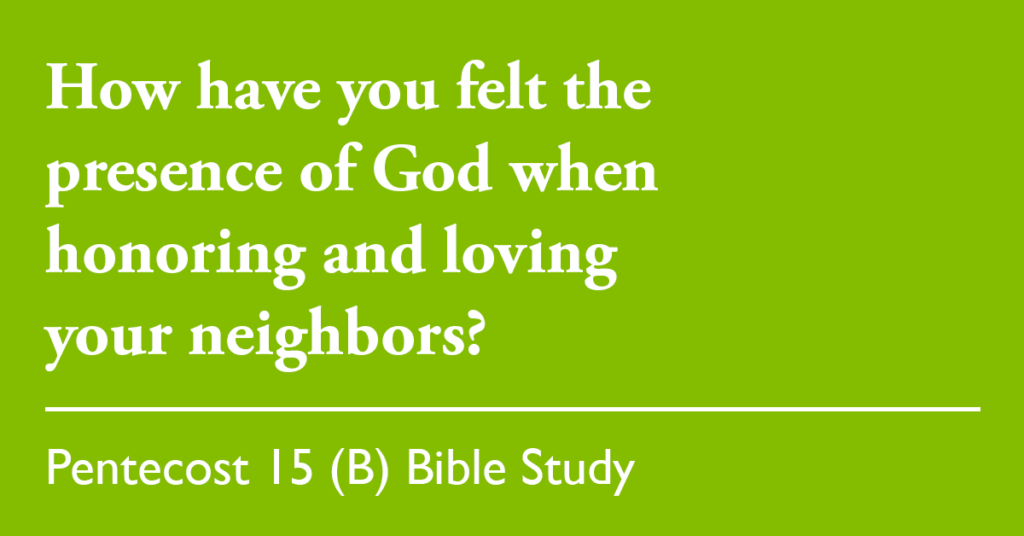Bible Study: Pentecost 15 (B) – September 1, 2024
September 01, 2024
Note: During the 2024 Season after Pentecost, Sermons That Work will use Track 2 readings for sermons and Bible studies. Please consult our archives for many additional Track 1 resources from prior years.
RCL: Deuteronomy 4:1-2, 6-9; Psalm 15; James 1:17-27; Mark 7:1-8, 14-15, 21-23

Deuteronomy 4:1-2, 6-9
Statutes, ordinances, and commandments; I wonder what thoughts or feelings these words might stir up for you. For some, these words seem restrictive, and for others reassuring. One person takes note of the limitations and another the expectation.
The Israelites have escaped enslavement, wandered in the wilderness, and are now entering the land God promised. Moving from oppression and survival mode to freedom and flourishing is yet another journey for God’s people. This journey is one of physical, emotional, and spiritual transition and transformation. Having statues, ordinances, and commandments supports and guides a new way of being. Being with God, being with one another, and being among and set apart from the surrounding nations. Yes, there are restrictions and limitations, but there are also clear expectations and the reassurance that theirs is a God who has been and continues to be near, faithful, and loving.
- In times of transition, do you find guidelines and expectations limiting or supportive? Could they be both?
- What might be the blessing of neither adding to nor taking away from the instruction God gives us? What might be the challenge?
Psalm 15
Who can dwell with God? Someone blameless and with no guile, who does no evil to friends, who rejects wickedness, who swears to do no wrong, and who does not give money in hopes of a hefty return. Whew, this is a tall order! Or is it?
It may seem impossible if the focus is only on the beginning of these verses, but when each verse is read completely, it sounds less like an unattainable standard and more like a way of honoring and loving God and our neighbors. How might we be blameless and do what is right? We can speak the truth in love. Inferring that friends and neighbors have a gracious intent keeps us from unhelpful internal dialogues and hurtful speech. Being honest with ourselves and our neighbors fosters healthy relationships. Giving with no expectation and being mindful of how our actions affect innocent and vulnerable populations is a way of seeking, serving, and loving our neighbors.
- What is a gracious intent? What might a gracious response look and sound like?
- How have you felt the presence of God when honoring and loving your neighbors?
James 1:17-27
Listening and considering what we say and do are ways we can respond that prevent us from reacting in angry, unjust, and unhelpful ways. Reactions tend to be quick and are usually not well-considered. Responding is different than reacting. Responding takes more time, and more time allows for more thinking and consideration. Reacting is easier than responding. Responding just requires more of us.
The author of James desires to promote the understanding and righteousness of being quick to listen, slow to speak, and slow to anger. Being bathed in Christ’s gift of love empowers us to rid ourselves of self-serving actions, imparts gentleness, generosity, and care for orphans and widows, oppressed, marginalized, and vulnerable folks. We not only hear, but we listen and respond in love, caring for all of God’s beloved children.
- Do you react or respond when faced with unfamiliar or stressful situations?
- How might you move from reacting to responding? Could fostering curiosity, generosity, and/or love be helpful?
Mark 7:1-8, 14-15, 21-23
There is a question one can ask that could be received positively (as in seeking to understand) or negatively (as an affront to the custom of a place or people): “Why do you/we do ______ this way?” More scandalous is suggesting a long-standing custom may not serve (or may even be a disservice to) the way it was intended.
The Pharisees and some of the scribes are focused on a long-held tradition, and on the surface, it would seem to be a good thing. Wash what you buy before you eat it, and take care to wash cups, pots, and kettles properly. But Jesus knows their hearts, and the two commandments on which hang all the Law and the Prophets: to love the Lord thy God and to love thy neighbor as thyself. The Pharisees and scribes are more concerned with human tradition than the commandments of God. Neither their tradition nor the intent of their hearts seeks to love God or their neighbor.
- What traditions do you revere that may be barriers to loving God and/or your neighbor?
- How might you examine customs and traditions to ensure they are inclusive?
The Rev. Rachel Joiner, a seminarian from the Seminary of the Southwest, is curate at St. Mark’s Episcopal Church in San Marcos, Texas.
¡No olvide suscribirse al podcast Sermons That Work para escuchar este sermón y más en su aplicación de podcasting favorita! Las grabaciones se publican el jueves antes de cada fecha litúrgica.


